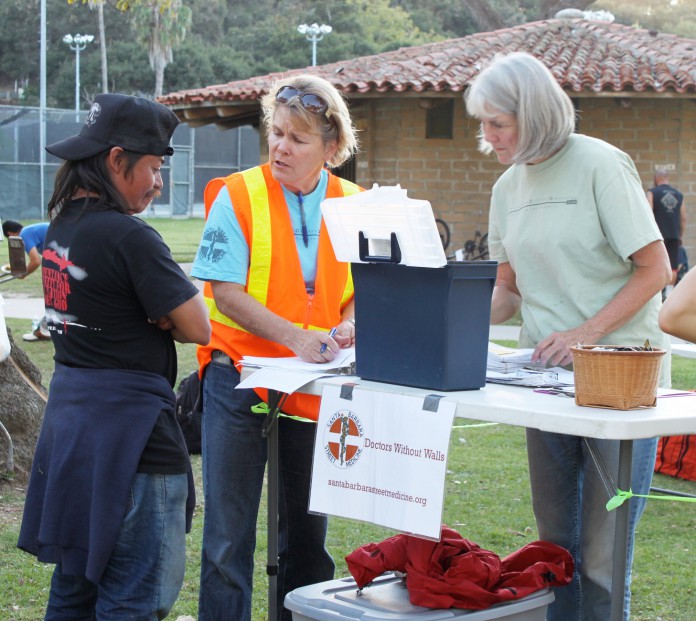Amanda Garcia
Executive Managing Editor
Approaching a homeless stranger on the street and engaging them in a friendly conversation may not be at the top of a to-do list for many. However, this task is an incredibly important aspect of everyday work for volunteers working with Doctors Without Walls-Santa Barbara Street Medicine.
Established in 2005, DWW-SBSM has provided free medical care and assistance for the homeless population of Santa Barbara for over a decade. Services may range from on-the-spot emergency care during their street rounds in downtown Santa Barbara or primary care consultations in one of their four clinics to giving a clean pair of socks and bottled water to someone in need. Friendly conversation, moral support and treating homeless patients with human respect and dignity are the everyday tools of DWW-SBSM volunteers.
“A lot of people we see here are regular people who have lost their jobs, lost their health insurance, lost their homes, and are now just trying to make ends meet,” said Dr. Jason Prystowsky, Interim Medical Director of DWW-SBSM. “If you look at our data, a lot of the people we’re seeing have been homeless for less than a year and that’s consistent with the economic recession.”
With an unemployment rate of 12 percent in the state of California, homelessness throughout the state has become more apparent and prevalent, especially with the lack of health care available to them.
“The reality is that this is a problem – it’s a problem that’s not going away and it’s a problem that’s worsening,” said Prystowsky. “We have a moral responsibility to address health disparities and inequalities in our own community.”
Here in Santa Barbara, many residents can see the homeless up and down State Street every day.
“I know a lot of students see homeless people there all the time, walk past them and ignore them,” said Ryan Nguyen, a fourth year micro-biology major and communications coordinator of DWW-SBSM. “But these are a lot of people who have fallen out of the system and don’t get medical care through the traditional clinics.”
According to Jessilee Coley, the program coordinator for DWW-SBSM, the majority of the homeless patients they attend to are in their 30s and 40s.
“We do also have a transient population of teenagers on the move either up or down the state,” said Coley. “We only see them once.”
DWW-SBSM also emphasize education and outreach within their clinics. Many volunteers are students who work as scribes for doctors, taking down patient information and history. While they take notes, physicians and clinical workers teach the student volunteers what certain medical terms mean, as well as what is happening during a patient consultation. Student volunteers find working with DWW-SBSM to be an invaluable experience.
“Our doctors are all amazing mentors,” said Coley. “It’s an educational experience to say the least.”
Physicians, clinical staff, social workers, and students who volunteer with DWW-SBSM will continue to provide free health care for the most vulnerable and in need at any of their four clinics: the Women’s Clinic, the Pershing Park Clinic, the Alameda Clinic and the Isla Vista Clinic.
“We can’t provide more housing, we definitely can’t fix the economy, but what we can do is provide health care, so that’s what we do,” said Prystowsky.












Comments are closed.